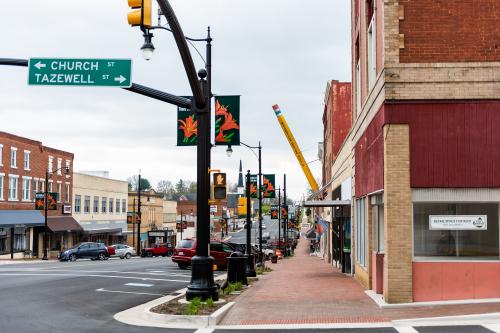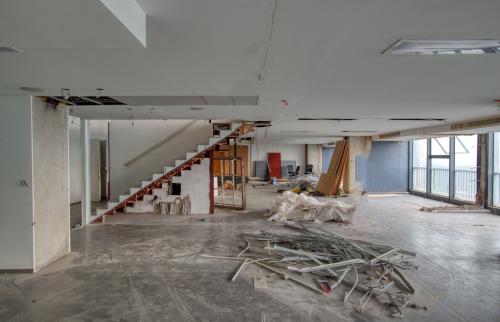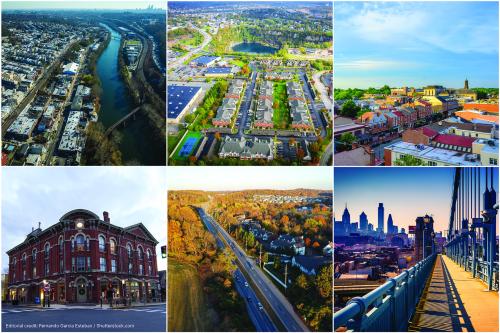Brockton is a mid-sized Massachusetts city located 25 miles south of Boston, and is a former hub for leading shoe manufacturers. Over the past few decades, the city’s historic neighborhoods struggled from the effects of urban renewal and neglect from long-departed property owners. While Brockton became a focus of state- and locally-led redevelopment efforts, these isolated investments failed to “move the needle”: follow-on investments didn’t occur, and perceptions of the city and its safety continued to decline.
Several years ago, officials in Massachusetts decided it was time for a different approach. What changed, and what has the new approach revealed about efforts to sustainably revitalize older industrial cities like Brockton?
The advent of the Transformative Development Initiative
Brockton is one of the Commonwealth of Massachusetts’s 26 Gateway Cities—a local term for our small-to-midsize, older industrial urban centers that haven’t seen the same growth and coordinated investment in recent decades as metro Boston. MassDevelopment, the state’s finance and development authority, has a legacy of investing in Gateway Cities. In downtown Brockton alone, for example, the agency provided financing to help transform a historic industrial building near a Massachusetts Bay Transportation Authority (MBTA) commuter rail stop into Station Lofts Apartments; rehabilitated the historic Brockton Enterprise building into a 51,000-square-foot commercial building; and supported the critical Brockton Neighborhood Health Center.
Yet the whole still fell short of the sum of the parts. To build on these and other individual investments, the agency sought a whole-systems approach that could more fully amplify redevelopment in Gateway Cities: a strategic framework to coalesce development efforts, bring new stakeholders into the process, connect the dots between key investments, and—most importantly—create momentum.
In 2014, building on the work of legislative and agency partners, MassDevelopment launched the Transformative Development Initiative (TDI), a place-based redevelopment program for Gateway Cities. TDI aims to enhance local public-private engagement and community identity; stimulate an improved quality of life for residents; and spur increased investment and economic activity. Rather than focus on single solutions, TDI knits together a range of efforts, resources, and investments within a compact five-minute walking radius, called a “TDI District,” to create a critical mass of activity that inspires follow-on investments by local residents, entrepreneurs, businesses, and other private sources.
Four years later, as MassDevelopment has wrapped up the program’s pilot phase and is preparing to expand the initiative further, the agency is taking stock of TDI. The results thus far point to three important design factors that can inform other states’ approaches to urban revitalization.
Bottom-up approaches
When the program launched, MassDevelopment issued a “Call for Districts,” an invitation for Gateway Cities to identify a specific neighborhood that was ripe for redevelopment. As part of this, cities identified a partnership of public, private, and nonprofit leaders, to be known as a “TDI Partnership,” that would commit to ensuring the new district’s success. After a competitive application process, MassDevelopment designated 10 such neighborhoods statewide to be TDI Districts and take part in the pilot program.
MassDevelopment then directed tailored assistance to each unique community based on their identified focus—resources that strategically capitalize on recent investments and address unmet needs. Accordingly, districts receive an individualized toolbox to help kick-start activity, which includes technical assistance, equity investments, small grants, and TDI Fellows. The fellows—who have experience in city planning, community partnership building, real estate, and economic development—are MassDevelopment employees embedded in TDI Districts who work with a TDI partnership for two to four years.
Along with TDI-specific tools, MassDevelopment deploys its existing Agency finance products and real estate expertise for projects in the cities, and coordinates with private and public sector partners to encourage development activity. Designed as a short-term, catalytic program, TDI depends on a variety of stakeholders and resources working together to jump-start development within a neighborhood and set the stage for long-term revitalization. The program’s time-limited framework helps provide the urgency needed to motivate a variety of stakeholders simultaneously, and the partnership’s short-term projects have the long-term goal of catalyzing follow-on investment.
Springfield, the state’s third-largest city and a western Massachusetts regional economic hub, provides a useful example of how this bottom-up approach works. The city experienced years of economic decline despite being home to Fortune 500 companies (MassMutual chief among them) and important national cultural assets. MassDevelopment established a TDI District based on the local public-private partnership’s vision of creating a downtown dining district, situated between the newly renovated Union Station and the just-opened MGM Casino. This area was already buoyed by recent MassDevelopment investments, including brownfields funding to support environmental work at the transformed Union Station and the purchase and rehabilitation of 1550 Main, now a thriving, fully tenanted office building. However, much of the nearby street frontage was vacant and detracted from the progress of these early investments.
The TDI partnership, supported by TDI Fellow Laura Masulis, sought to increase foot traffic, add restaurants and amenities for new market-rate housing units, and increase the visibility of investment opportunities. First steps to develop the district included tailored real estate technical assistance, which consisted of urban design strategies for the public realm and providing a market narrative and investor prospectus to help attract development. This work, with the support of a third-party consultant, built on prior planning efforts. This early technical assistance helped increase investment in local real estate, which in turn encouraged the city to boost its own investment in local pocket parks. At the same time, Masulis helped numerous small businesses launch in vacant storefronts and worked to stabilize existing shops. Today, a burgeoning international restaurant scene, new businesses, increased development investment, scenic and social parks with outdoor dining and mobile vendors, enhanced public transit, and renewed momentum are redefining downtown Springfield.
Robust stakeholder and community engagement
While each TDI District has experienced growth during the course of the program, the most successful TDI partnerships are those that have engaged a great number of stakeholders in the local process to invest both time and money in their districts.
The TDI partnership in Lynn, a large Gateway City located just north of Boston, found that engagement through public art helped buoy local identity, increase positive local and regional press, and lead to increasing interest in a downtown renaissance. MassDevelopment sponsored a community planning effort that laid the groundwork for several grassroots initiatives to take shape, including the popular mural festival and creative placemaking initiative Beyond Walls, an organization now entering its second year as a standalone nonprofit that has begun to consult and share best practices with other area cities.
Across the state, TDI has demonstrated the value of the program’s effort of using robust stakeholder and community engagement to catalyze direct follow-on investments. By the end of year three, MassDevelopment had invested more than $8.5 million in the districts, and had leveraged direct related investments from other public and private sources of more than $80 million. Aside from instilling a sense of community investment—co-investment, in TDI speak—within a district’s partnership and stakeholders, MassDevelopment has also used TDI to assist in the launch and growth of more than 125 small businesses in the districts, helping create commerce and a quality of life that will support planned and ongoing housing development.
Entrepreneurial approaches
Finally, what makes TDI unique is also what makes TDI work. The program’s flexible, out-of-the-box approach has enabled TDI districts to overcome enduring development challenges of scarce resources and limited staff capacity. MassDevelopment designed TDI to be nimble, to respond quickly to local needs with its resources, and to help build better connective tissue between hyper-local and state-level activity. TDI partnerships are able to take an entrepreneurial approach to program deployment, testing new ideas and pursuing those that work. In this way, TDI acts as an “innovation lab” for MassDevelopment, piloting economic development interventions in TDI Districts that can later be scaled statewide. The Commonwealth’s Collaborative Workspace Program and Commonwealth Places are two such examples. Meanwhile, on-the-ground TDI Fellows, supported by MassDevelopment’s breadth of experience, enhance a district’s economic development capacity by providing expertise and leadership.
With all this in mind, MassDevelopment has launched what it calls “TDI 2.0.” Fellows are currently in place in Brockton, Holyoke, Lynn, New Bedford, Pittsfield, and Springfield. This spring, the Agency added four new districts and fellows to the program—in Chelsea, Fitchburg, Lawrence, and Worcester—and extended designations for six other existing districts. While successful, TDI remains a high-touch program that relies on direct and deep relationships between MassDevelopment and the municipalities served.
Implementing the Commonwealth’s first-ever program for transformative development has given the agency and its TDI team new insight in how to approach economic development. The 10 cities that participated in the pilot program have proven that there’s no silver bullet to revitalizing neighborhoods, no “one size fits all” approach; in reality, it’s about empowering people and partnerships that can work together to build healthy economic futures for their districts, cities, and regions. MassDevelopment’s TDI network provides plenty of opportunities to discuss best practices, share challenges, and brainstorm solutions. TDI is a chance for everyone who cares about Gateway Cities and their counterparts in other states to learn, test, and improve together.
The Brookings Institution is committed to quality, independence, and impact.
We are supported by a diverse array of funders. In line with our values and policies, each Brookings publication represents the sole views of its author(s).







Commentary
Transforming local economic development in Massachusetts’ older industrial cities
September 21, 2018